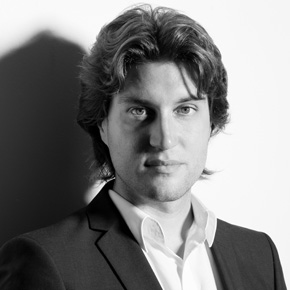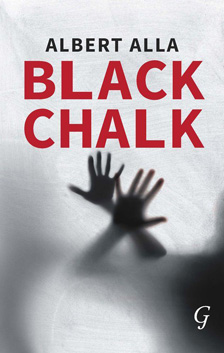Coconuts and random acts
by Albert AllaAlbert Alla’s debut novel Black Chalk is an unsettling exploration of passion and modern morality in which the sole witness and survivor of a school shooting in the Oxfordshire countryside returns to the scene of the devastation after eight meandering years searching for meaning and reconciliation in big cities and on small islands. He was recently back in Paris, where he wrote the book over twelve months.
Belleville, Paris, Thursday evening
This is the sort of night you can’t have in small places. The bar’s walls are lined with slam posters, and what’s left bare is full of purples, yellows and glass fragments. The terrace is packed but there are free chairs inside. Paris is all about the streets when the days are long.
Xanadu. The host calls his name and he pulls a balaclava over his face. There’s something odd about the man, but odd’s the norm out here. By the time he gets on stage, all the people on the far end of the room are averting their eyes. From my seat, I can’t see the issue. Xanadu’s in full costume: no shoes, black tights over his legs, the sort of Indian shirt only tourists wear, and a big long silk blue scarf dangling from his neck all the way down to his crotch. The host is trying to take a picture for the blog, and she’s stretching her arm so far from her front-row position that she almost topples over. Why doesn’t she just take the usual photo from where she’s sitting?
I like his scarf. It dangles and swings over his crotch as he delivers his lines, bare white thighs glaring through the sheer nylon. It’s a remarkable scarf, the sort of bold thing I’ve only seen in Asia. He finishes his first poem, turns to grab one of his books, the scarf sways from his body, and I’m suddenly seeing way more of Xanadu than I’ve ever wanted. It’s my turn to avert my eyes.
Fifteen minutes later, he’s stripping in the middle of his bar, meticulously folding his costume, putting his street clothes back on, and he comes outside to join the conversation.
Mild Asperger’s, or just a man who’s given in to Dadaism? I can’t say that I listened to much of his poetry – a friend swears it’s all random computer-generated stuff – but I have a thing for people who give everything to their art.
Wallis, Wallis and Futuna, Saturday morning
A year earlier, the light is so bright I’m squinting behind my sunglasses. I pull in at the only petrol station in Mu’a, a cracked slab with two ancient pumps and a shop selling biscuits and canned meats. The attendant knows me and I don’t know him, but I don’t let that show. He’s six two and there’s not a gram of fat on his frame. Full tank, I say, and he grunts aggressively. He’s probably got an uncle who doesn’t like what I’m doing. He’s probably been drunk with people who don’t like what I’m doing. He might even be drunk now, and he certainly doesn’t like white men taking airs. He puts the nozzle in, and then he sees a couple of coconuts that have fallen into the back of my pickup. He grabs one in his left hand, makes sure I can see him, and slams it into his right elbow. The coconut splits open, he quenches his thirst, tosses the broken shell away.
11th Arrondisement, Paris, Monday evening
I’ve spent three years in the Pacific, splitting my time between New Caledonia and Wallis. New Caledonia has a quarter of a million people and a quarter of the world’s nickel. Money flows in and stirs things up. Wallis has nine thousand people and twice as many pigs. It’s in decline, the sort of place that an interconnected world can’t sustain.
I’m in Paris at a spoken-word event, and I have to decide whether I’m going to skip my flight back to the Pacific. A poet gets up and reads a text full of greys and blacks, in which the night is liquid, time is confused, and the city coughs. Think of The Road, only bleaker.
There’s something about small places. Last time I landed in Nouméa, the border patrol officer greeted me by name before he opened my passport. In Wallis, when I drive, my index finger rises from the wheel every time I pass another car. Every now and again, I get caught in my own thoughts and forget. A day or two later, someone will remind me of it: I was waving at you, didn’t you recognise my car?
In the middle of Black Chalk, Nate goes travelling. Cloistered for months, the need for change takes hold of him, and he finds himself following its impulses. He leaves a trail of small places behind. Perhaps he should have gone and lived in a big city – Paris or Berlin. Then he could have walked the streets and watched life unfold, like one of Flaubert’s ambling emblems. And he could be listening to this woman occupying the stage, attacking the patriarchy with all the subtlety of a clenched fist.
In the book that brought him down, Jonah Lehrer talks of cities and creativity. The argument goes that doubling the size of a city increases the patent-per-capita ratio by fifteen per cent. That is, that the bigger the city, the more creative its people become. Ceteris paribus, going from nine thousand people to Paris should make me four times as creative. What shall it be: coconuts or better prose?
While someone reads through their version of a break-up, I stare across the room at people. Eyes are dancing, glancing and locking, and he’s ignoring her, and she holds my eyes for three long drawn-out seconds. The woman on the couch is wringing her hands, as if in one convoluted prayer, while she studies the performer’s shoes. Does she want to pee?
Small places are closed systems full of organic rules that have hardened with time. Big cities have rules too, reams of them, but they’re so easy to ignore. Who gives the homeless a second glance? And it’s this constant challenge that I miss.
Upstairs, a friend tells me about his novel. It’s an exciting affair, full of narrow escapes and ticking bombs, nothing like the usual coming-of-age, it’s-really-not-about-me first novel, and I want to hear more about how he’s developed his characters, and how he’s going about his third draft. Half an hour later, we’re talking about a theatre performance we should put together, and the tone turns serious. One shouldn’t trifle with plays.
“But hold on,” he says “I thought you were leaving in a couple of days?”
 Albert Alla was born in the south of France and moved to Australia when he was 13, later studying for an MPhil in Economics at Balliol College, Oxford. He now lives in the Pacific, dividing his time between New Caledonia and Sydney.
Albert Alla was born in the south of France and moved to Australia when he was 13, later studying for an MPhil in Economics at Balliol College, Oxford. He now lives in the Pacific, dividing his time between New Caledonia and Sydney.
albertalla.com
Black Chalk is published by Garnet. Read more.


